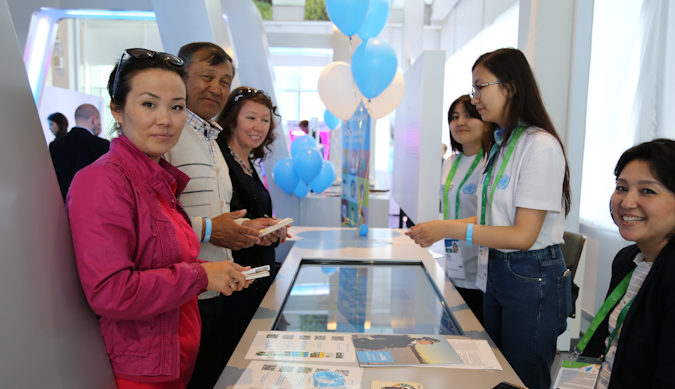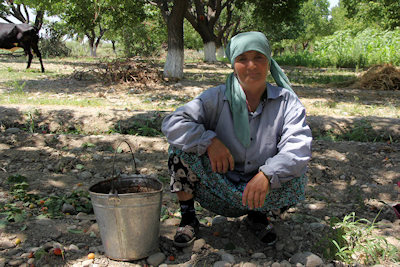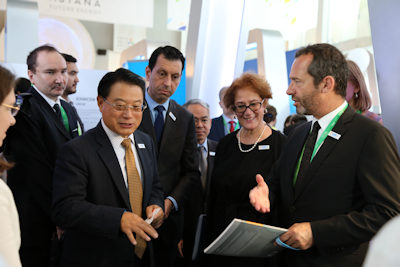UN Women spotlights women and energy at EXPO 2017
Date:

At EXPO 2017 in Kazakhstan, UN Women’s booth showcases low-cost, sustainable projects that give women access to energy and train them in renewable technologies.
This summer, UN Women energy projects and initiatives that benefit women and fight climate change take centre stage at EXPO 2017 in Astana, Kazakhstan. Held from 10 June to 10 September, EXPO 2017 promotes energy efficiency, sustainable energy production and renewable energy initiatives, and has already attracted more than 30,000 visitors from around the world.
Over one billion people across the globe have no access to electricity. Women disproportionately bear the burden in homes that have no energy services: They cook, keep the home warm, heat water to wash dishes and bathe children, and spend hours each day collecting fuel.

Women face significant health and safety risks from poor lighting, household air pollution, and from carrying heavy fuel loads. Yet, they are largely absent from the industries that produce modern sources of renewable energy.
Located at the UN Pavilion in the International Organizations’ Plaza, C2, the UN Women/UNESCO booth at EXPO 2017 draws attention to women’s role in energy-related initiatives and features low-cost, sustainable projects from Asia to Africa that give women access to energy, promote sustainable energy technology and address water scarcity and energy poverty.
“Every woman, man and child must have access to affordable and sustainable energy by 2030,” says Elaine M. Conkievich, UN Women Representative, Head of Multi-Country Office Kazakhstan, Tajikistan, Turkmenistan and Uzbekistan. “Strengthening women’s leadership and participation in energy solutions is critical for sustainable development.”
Visitors to the UN Women booth can learn about Mavzuna, 56, who lives in a Tajik village that borders Kyrgyzstan and used to spend at least three hours a day collecting fuel for cooking and cleaning. Her life changed after a UN Women-supported workshop* last year taught her and other women from Tajikistan and Kyrgyzstan how to make solar water heaters. Working with women from another country also helped build cooperation and trust between border communities.

The booth also features a UN Women collaboration with Barefoot College in India that trained illiterate older women from Africa as solar engineers and brought electricity to their communities.
“We have worked with UN Women and the Barefoot College in India. Women need to be at the centre of the energy discourse. I’m very happy to see this exhibited at EXPO 2017,” says Paras Loomba from India, Global Himalayan Expedition.
Other UN Women initiatives on display include a large-scale Women’s Entrepreneurship for Sustainable Energy (WESE) programme in India that will reach 100,000 disadvantaged women and an initiative In Central Asia where UN Women is training rural women to build greenhouses and solar installations. UNEP and UN Women have also launched a Flagship Programme Initiative on Women’s Entrepreneurship for Sustainable Energy that fosters women’s enterprises in the energy sector.
“We travelled from another part of the country to see EXPO 2017. I’m so happy to see that this global exhibition is bringing up women’s issues in energy. As main household workers, women need to have access to electricity to be able to have their own life – to be able to rest, to work, to study,” says Sulushash Aibakhova, from Aktobe, Kazakhstan.
* The workshop took place as part of the “Cross-border cooperation project for sustainable peace and development” funded by UN Peace Building Support Office (PBSO)/Peace Building Fund and the Swiss Development Cooperation.